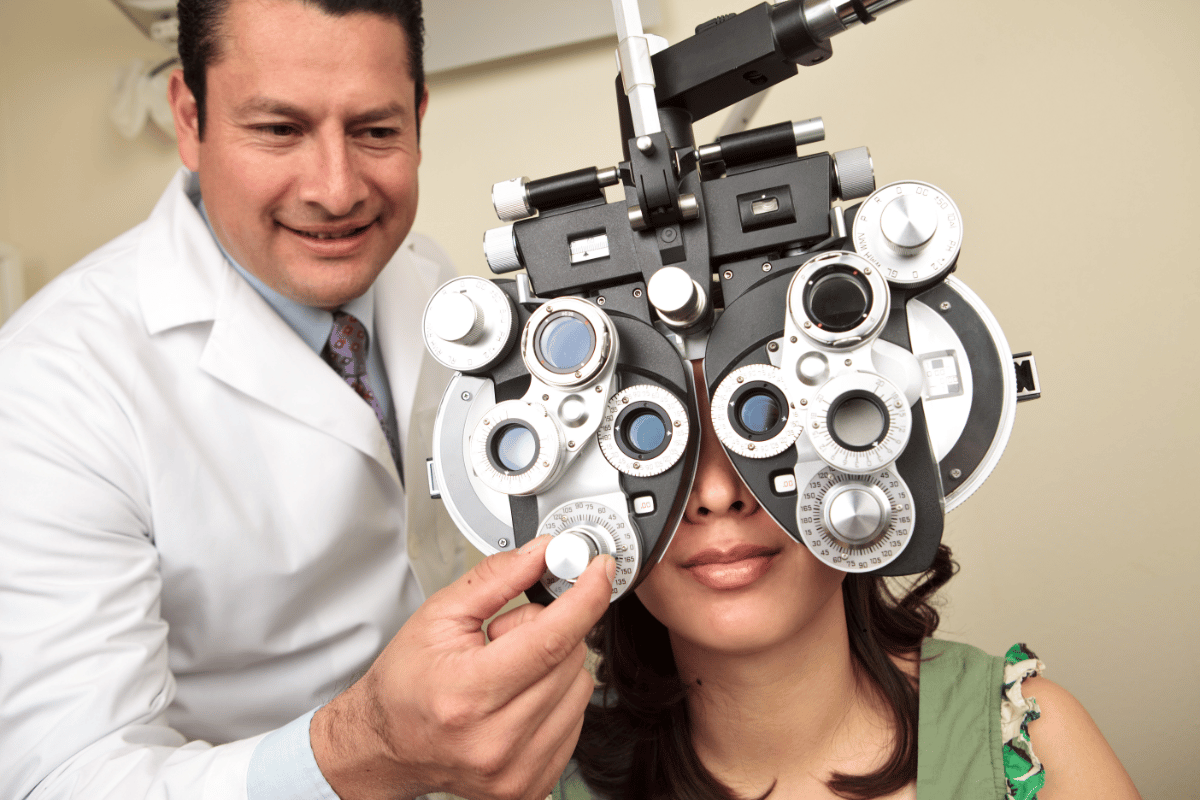Optometrist Job Description
In your role as an optometrist, you’ll earn a Doctor of Optometry degree from an accredited school, dedicating four years to studying ocular anatomy and diseases. Your tasks will include evaluating patients’ vision, managing time efficiently, and explaining diagnoses clearly. You must master tools like retinoscopes and be proficient in fitting various lenses. Patient care demands personalized treatment plans and advanced technology use. Your specialization may cover laser treatments and specific eye conditions. Licensing involves passing exams and staying updated. Embrace a profession where precise vision management defines your impact on others’ eye health.
Key Takeaways
- Conduct comprehensive eye exams and diagnose eye conditions accurately.
- Prescribe corrective lenses and personalized treatment plans for optimal vision care.
- Utilize advanced diagnostic tools and technologies for precise assessments.
- Communicate effectively with patients to explain diagnoses and treatment options.
- Stay updated on optometry regulations, certifications, and ongoing education for professional growth.
Educational Requirements
To become an optometrist, achieving a Doctor of Optometry (OD) degree from an accredited optometry school is a necessary educational requirement. Optometry school provides a thorough curriculum focusing on ocular anatomy, physiology, optics, and diagnosing eye diseases. The program typically lasts for four years and includes both classroom instruction and clinical training to guarantee a well-rounded education.
Following the completion of optometry school, aspiring optometrists have the option to further enhance their skills and knowledge through residency programs. These programs offer specialized training in areas such as pediatric optometry, geriatric eye care, or ocular disease management. Residency programs usually last for one year and provide hands-on experience under the supervision of experienced optometrists.
Following the completion of optometry school, aspiring optometrists have the option to further enhance their skills and knowledge through residency programs. These programs offer specialized training in areas such as pediatric optometry, geriatric eye care, or ocular disease management. Residency programs usually last for one year and provide hands-on experience under the supervision of experienced optometrists.
For those exploring advanced educational opportunities, several online optometrists programs offer flexible options to gain additional expertise while balancing other commitments.
Job Duties
Regularly evaluate patients’ vision and eye health through thorough eye exams and diagnostic tests. As an optometrist, efficient time management is essential to guarantee all patients receive thorough care. You must prioritize appointments, allocate sufficient time for each examination, and promptly address any urgent cases that may arise.
Communication skills are paramount in your role as an optometrist. You must clearly explain complex medical terms and procedures to patients in a way that’s easily understandable. Additionally, effective communication with your colleagues, such as ophthalmologists or opticians, is crucial for coordinated patient care.
In addition to examining patients’ eyes, optometrists also interpret test results, provide accurate diagnoses, and develop personalized treatment plans. Documenting patient information accurately and concisely is crucial for maintaining clear medical records and tracking progress over time.
Furthermore, optometrists often prescribe corrective lenses or other vision aids based on their assessments. Educating patients on proper eyecare practices and the correct usage of prescribed eyewear is another important aspect of the job. Remember, as an optometrist, your dedication to precision and patient-centered care is key to promoting excellent eye health.
Clinical Skills
Developing proficient clinical skills as an optometrist necessitates mastering a range of diagnostic techniques and treatment protocols. It’s essential to stay updated with the latest advancements in the field to provide excellent care for your patients.
Some key areas to focus on include:
- Refractive Surgery: Understanding the various types of refractive surgeries such as LASIK, PRK, and SMILE is important. Being able to assess candidacy, pre-operative evaluations, and post-operative care for these procedures is necessary for thorough patient management.
- Contact Lenses: Proficiency in fitting different types of contact lenses including soft, rigid gas permeable, toric, and multifocal lenses is essential. Knowledge of the latest contact lens technologies and materials is crucial to meet the diverse needs of patients.
- Diagnostic Techniques: Mastering skills in using tools like retinoscopes, autorefractors, slit lamps, and tonometers is crucial for accurate diagnosis and monitoring of ocular conditions.
- Treatment Protocols: Developing tailored treatment plans for conditions like dry eye, glaucoma, and macular degeneration requires a deep understanding of pharmacology and ocular disease management.
Patient Care
Mastering patient care as an optometrist involves implementing personalized treatment plans and ensuring excellent ocular health outcomes for individuals under your care. Your expertise in vision correction is essential in addressing visual acuity issues through precise prescriptions for glasses or contact lenses. Conducting thorough eye exams is vital to assess visual acuity, detect early signs of eye diseases, and monitor overall eye health.
When interacting with patients, effective communication is key to understanding their concerns, explaining treatment options, and ensuring compliance with prescribed regimens. Your ability to empathize and educate patients about their eye conditions plays a significant role in fostering trust and cooperation. Additionally, providing counseling on preventive measures, such as UV protection and proper eye care practices, contributes to long-term ocular health.
Incorporating advanced diagnostic tools and techniques into your practice enhances the accuracy of your assessments and treatment plans. Staying updated on the latest advancements in optometric care allows you to offer excellent patient care and achieve favorable outcomes in managing various eye conditions.
Technology Usage
Utilize cutting-edge diagnostic technologies to enhance your optometric practice and provide precise assessments for best patient care outcomes. Incorporating remote consultations and digital tools into your practice allows for efficient communication with patients, enabling you to provide timely advice and guidance even from a distance. Virtual reality technology can revolutionize the way you assess and treat certain eye conditions, offering immersive experiences for patients during vision therapy or testing.
- Remote Consultations: Conduct virtual appointments and follow-ups for patients unable to visit in person.
- Digital Tools: Utilize advanced software for accurate refraction measurements and patient record management.
- Virtual Reality: Implement VR simulations for vision exercises and rehabilitation programs.
- Telemedicine: Offer teleoptometry services for quick consultations and initial assessments.
Specializations
As an optometrist, your specialization involves the essential understanding and treatment of various eye conditions.
Utilizing advanced diagnostic technology is vital in evaluating and managing ocular health.
Additionally, being knowledgeable about surgical intervention options allows for the effective coordination of care for patients requiring such procedures.
Eye Conditions Treated
Specializing in the treatment of various eye conditions, optometrists possess expertise in diagnosing and managing a range of ocular disorders. Optometrists commonly address conditions related to vision correction, such as nearsightedness and farsightedness, through prescribing glasses or contact lenses.
They also conduct thorough eye exams to detect issues like refractive errors, including astigmatism. Additionally, optometrists are skilled in diagnosing and treating conditions like dry eye syndrome, which can cause discomfort and affect vision quality.
Furthermore, they manage conditions such as conjunctivitis (pink eye) by providing appropriate treatment and guidance to alleviate symptoms and promote healing.
Advanced Diagnostic Technology
Employing cutting-edge diagnostic technology, optometrists specialize in utilizing advanced tools to assess and diagnose various ocular conditions with precision and accuracy. Through telemedicine, optometrists can remotely evaluate patients, offering benefits such as increased access to care and convenience.
However, challenges in conducting thorough eye exams virtually may hinder the accuracy of diagnoses. Additionally, optometrists leverage remote monitoring capabilities to track patients’ eye health over time, enabling proactive management of conditions. Challenges in remote monitoring include ensuring data security and the need for patient compliance with at-home testing procedures.
Surgical Intervention Options
To further expand on the domain of optometry, the focus now shifts towards exploring the domain of Surgical Intervention Options, specifically the various specializations within this field. When considering surgical intervention options in optometry, there are several key areas that optometrists specialize in. These include:
- Non-invasive treatments such as laser procedures
- Alternative solutions for refractive errors
- Recovery process post-surgery
- Specialized techniques for treating specific eye conditions
Optometrists trained in surgical interventions provide essential services for patients requiring advanced care beyond traditional optometric practices. By staying informed about the latest advancements in surgical techniques and technologies, optometrists can offer thorough eye care to their patients, ensuring excellent visual health and outcomes.
Licensing and Certification
Licensure requirements for optometrists vary by state and typically involve completing an accredited Doctor of Optometry program and passing the National Board of Examiners in Optometry (NBEO) examinations. Once you have met these requirements, you can apply for state licensure to practice optometry. To help you understand the licensing process better, here is a breakdown of key aspects related to licensing and certification in the field of optometry:
| Aspect | Details |
|---|---|
| Exam Preparation | Optometrists must prepare thoroughly for the NBEO examinations to ensure successful completion. |
| Continuing Education | To maintain licensure, optometrists must engage in ongoing education to stay current with advancements in the field. |
| State Regulations | Familiarize yourself with your state’s specific regulations regarding optometry practice to guarantee compliance. |
| Professional Organizations | Joining professional optometry organizations can provide valuable resources and networking opportunities for your career growth. |
Frequently Asked Questions
Do Optometrists Perform Eye Surgeries?
Optometrists typically do not perform eye surgeries. Their training focuses on diagnosing and treating vision problems, prescribing glasses or contact lenses, and managing certain eye conditions. Surgeons, such as ophthalmologists, are specialists in performing eye surgeries.
What Is the Average Patient Load per Day?
On average, you’ll handle about 20-25 patients a day as an optometrist. Each encounter involves precise assessments, vision tests, and personalized care. Your patient load requires expertise in diagnosing and treating various eye conditions.
Are Optometrists Allowed to Prescribe Medication?
You’re not handing out pills like candy! Optometrists have prescribing limitations dictated by optometry regulations. They can provide certain medications but are restricted in others, aligning with their specialized optometrist roles and medication restrictions.
How Often Do Optometrists Attend Professional Development?
To stay current in the field, optometrists attend continuing education courses regularly. This guarantees they are up-to-date on industry trends and advancements. Networking opportunities at such events also help in professional development and certification.
What Are the Typical Work Hours for Optometrists?
In the field of optometry, typical work hours for optometrists often include flexible schedules with the possibility of overtime. Some optometrists may also offer remote consultations and telemedicine options to cater to different patient needs.
Conclusion
In summary, becoming an optometrist requires dedication to obtaining the necessary education, clinical skills, and licensing.
With a focus on patient care and the use of advanced technology, optometrists play an important role in diagnosing and managing vision problems.
Specializing in areas such as pediatric optometry or low vision rehabilitation allows optometrists to provide specialized care to their patients.
Overall, optometrists are essential healthcare professionals who help individuals maintain excellent vision health and quality of life.







